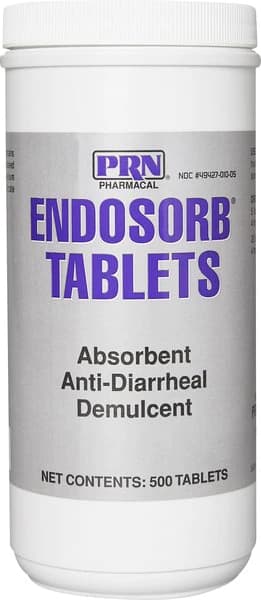Endosorb® Tablets: Usage, Side Effects, Precautions
When our furry friends suffer from digestive troubles, it can be as distressing for us as it is for them. Endosorb® Tablets have become a go-to solution for many pet owners and veterinary professionals for managing pets’ digestive issues. Understanding how to use this medication responsibly is crucial in ensuring the safety and well-being of our pets.

What Will We Learn?
Introduction
Endosorb® Tablets are designed to support the treatment of gastrointestinal problems in pets, such as diarrhea. These tablets help alleviate the irritation, discomfort, and cramping associated with digestive disturbances. Despite their effectiveness, like all medications, they must be used correctly.
See also: Selarid For Cats: Ensuring the Purrfect Wellness
Usage and Dosage
The correct dosage of Endosorb® Tablets varies depending on your pet’s size and the severity of their symptoms. Smaller pets will require a lower dose than larger ones, and it’s important to adhere to the recommended guidelines.
Administration Instructions:
- For small dogs: 1/2 tablet every 4 hours.
- For larger dogs: Up to 2 tablets every 4 hours.
- For cats: Typically a smaller dose, similar to small dogs.
Always follow the advice of your veterinary professional, who may tailor the dosage based on your pet’s specific needs. The tablets should be administered orally, and can be given with or without food. If given without food, make sure your pet has access to plenty of water.
See also: Why Do Dogs Sleep So Much?
Side Effects
While Endosorb® Tablets are generally safe when used as directed, there is the potential for side effects, such as constipation or darkened stools. If you observe any adverse reactions, consult with your vet promptly.
Managing Side Effects:
- Constipation: Ensure your pet stays hydrated. If problems persist, seek veterinary advice.
- Dark stools: This can be a normal reaction due to the medication’s ingredients. If the stool color does not return to normal after cessation of treatment, consult your vet.
Precautions
Who Should Use Caution:
- Elderly pets: They may be more sensitive to the effects of Endosorb® and require close monitoring.
- Pets with pre-existing conditions: Particularly those with kidney or liver issues may need lower doses or different treatments.
- Pregnant or lactating pets: Consult with your vet before administering Endosorb® to these pets.
Interaction with Other Drugs
Endosorb® Tablets may interact with other medications, which can either reduce their effectiveness or exacerbate side effects. Always inform your vet about any other drugs your pet is taking, including over-the-counter supplements or remedies.
See also: Can Rabbits Eat Blackberries? Golden Suggestions
Common Drug Interactions:
- Antibiotics: May have their absorption altered.
- Antacids: Could potentially diminish Endosorb® effectiveness.
Effects on Pregnant and Breastfeeding Pets
Like any medication, caution is advised when considering Endosorb® for pregnant or breastfeeding pets. The lack of extensive research into this area means potential risks may not be fully understood. Always consult your veterinarian for advice specific to your pet’s unique situation.
Conclusion
Endosorb® Tablets can be instrumental in managing your pet’s digestive health. However, the importance of adhering to the correct dosage, being aware of potential side effects and drug interactions, and considering the precautions for specific groups of pets cannot be overstressed.
Always engage with a veterinary professional before starting any medication regime. Their guidance ensures that your beloved pet receives the best possible care, keeping them happy, healthy, and active.
Remember, we’re in this together for the health of our pets! 🐾
